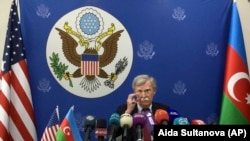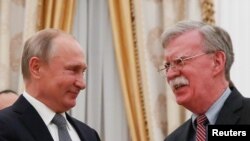On Wednesday, October 24, Russian markets jumped to their highest level and the U.S. dollar fell against the Russian ruble to its lowest since last August, reaching 65.13 rubles to the dollar.
The Moscow Exchange rose by 1.6%, with stocks of Russia’s biggest state bank, Sberbank, leading the winners with a 4.1% increase in its share price.
The economic euphoria was sparked by Russian media reports quoting the U.S. National Security Adviser John Bolton as saying at a press conference in Baku, Azerbaijan, that the U.S. has no plans for additional sanctions against Russia. As you will see, the reports are false.
The reports spread instantly after the Interfax news agency posted an article citing Bolton’s comments in Baku.
Later in the day on October 24, Interfax followed up with an update that the euro was also reacting to the news of “no additional” U.S. sanctions by falling against the Russian ruble, reaching its lowest value since August – 74.14 rubles to the euro.
The optimism followed what appeared to be either an incorrect conclusion or a fabrication by Interfax, which claimed Bolton said the U.S. had “no plans” to impose additional sanctions.
Here is what Bolton actually said, according to the Reuters news agency:
“On the potential for additional sanctions on Russia, we are still considering what we may be obligated to do under a statute related to chemical weapons attacks. No decision has been made at this point, and I wouldn’t predict the timing, whether it might be before the (U.S. mid-term) elections or after the elections. The decision-making is ongoing as we speak.”
Reuters also pointed out Interfax had “incorrectly reported” Bolton’s comments.
Russian President Vladimir Putin repeatedly denies the U.S. sanctions have any negative effect on Russian economy, while some of his government top officials called the U.S. policy towards Russia "genocide through sanctions" -- claims that Polygraph.info debunked on multiple occasions.






